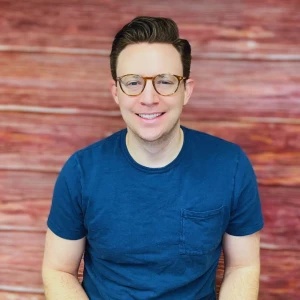The in-person symposium will feature external speakers discussing various aspects of open science, sharing insights, and fostering collaboration.
- Location: The Lindsay Young Auditorium in John C. Hodges Library, University of Tennessee, Knoxville
- Date & Time: April 3, 2025, 3:30 - 4:00 PM ET (Reception), 4:00 - 5:15 PM ET (Symposium)
Speakers¶
Matt Forrest¶

Affiliation: Wherobots
Title: Head of Product-Led Growth
Website: https://forrest.nyc
Presentation title: Cloud-Native Geospatial for Interoperability and Scalable Machine Learning and LLM Compatibility
Brief bio: Matt Forrest is a geospatial expert, educator, and advocate for modern GIS. As the Head of Product-Led Growth at Wherobots, he is driving the adoption of scalable, cloud-native geospatial solutions, helping organizations integrate cutting-edge spatial analytics into their workflows.
Beyond his role at Wherobots, Matt is building one of the most comprehensive platforms for GIS education. Through Modern GIS, his learning platform, he is reshaping how professionals approach geospatial data by emphasizing open-source tools, interoperability, and real-world applications. His LinkedIn community is a hub for discussions on the future of GIS, while his YouTube channel dives deep into undercovered topics in geospatial technology, bridging the gap between traditional GIS and modern data engineering.
With a passion for making spatial thinking more accessible, Matt is on a mission to help GIS professionals expand their skills and stay ahead in an evolving industry.
Dr. Tasha Snow¶

- Affiliation: UMD Earth System Science Interdisciplinary Center and NASA Goddard Space Flight Center
- Title: Research Scientist
- Website: https://
tsnow03 .github .io - Presentation title: Open science as a process, not a product: Insights from the NASA CryoCloud JupyterHub communities
- Brief bio: Dr. Tasha Snow is a research scientist who co-founded the CryoCloud geoscience cloud-computing community and received the 2023 AGU Open Science Recognition Prize. She spends much of her time working to broaden scientific collaboration capabilities, facilitate open-source software development, and accelerate scientific workflows. In parallel to her open science work, her research focuses on building new ways of using satellite data to study ocean and glacier changes in Greenland and Antarctica.